Entrepreneurship: Types of Ventures and Economic Impact Report
VerifiedAdded on 2020/10/22
|22
|7069
|309
Report
AI Summary
This report provides a comprehensive overview of entrepreneurship and small business management. It begins by defining key terms like entrepreneur, entrepreneurship, and entrepreneurial ventures, and then categorizes different types of entrepreneurial ventures, including survival firms, lifestyle firms, scalable startups, and social enterprises, highlighting their characteristics and objectives. The report assesses the impact of small and micro businesses on the economy, providing relevant data and statistics to illustrate their significance. It further explores the characteristics, traits, and skills of successful entrepreneurs, differentiating them from other business managers and delving into the entrepreneurial mindset. The report also examines how an entrepreneur's background can either hinder or foster their entrepreneurial journey, offering a holistic view of the factors influencing entrepreneurial success.

Entrepreneurship and
Small Business
Management
Small Business
Management
Paraphrase This Document
Need a fresh take? Get an instant paraphrase of this document with our AI Paraphraser
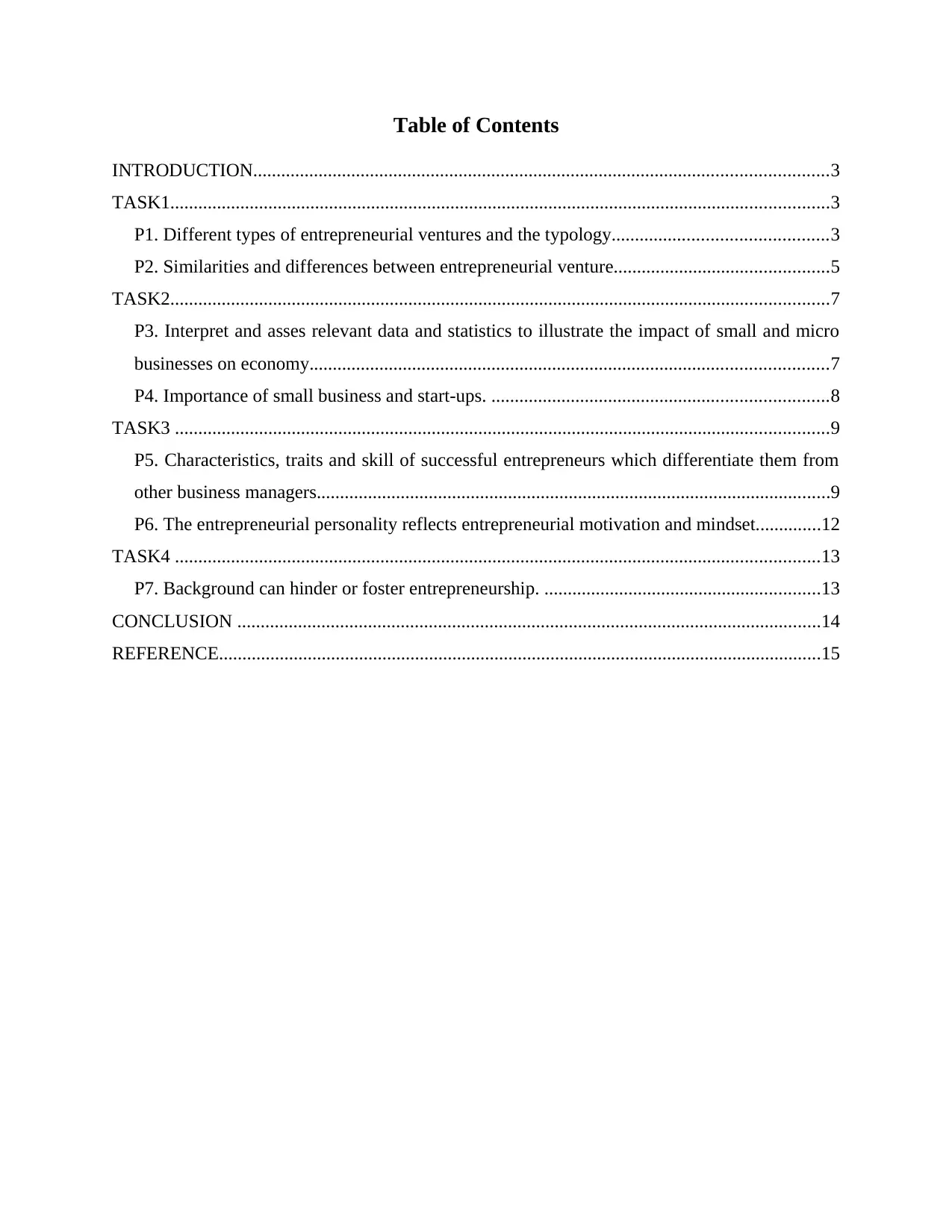
Table of Contents
INTRODUCTION...........................................................................................................................3
TASK1.............................................................................................................................................3
P1. Different types of entrepreneurial ventures and the typology..............................................3
P2. Similarities and differences between entrepreneurial venture..............................................5
TASK2.............................................................................................................................................7
P3. Interpret and asses relevant data and statistics to illustrate the impact of small and micro
businesses on economy...............................................................................................................7
P4. Importance of small business and start-ups. ........................................................................8
TASK3 ............................................................................................................................................9
P5. Characteristics, traits and skill of successful entrepreneurs which differentiate them from
other business managers..............................................................................................................9
P6. The entrepreneurial personality reflects entrepreneurial motivation and mindset..............12
TASK4 ..........................................................................................................................................13
P7. Background can hinder or foster entrepreneurship. ...........................................................13
CONCLUSION .............................................................................................................................14
REFERENCE.................................................................................................................................15
INTRODUCTION...........................................................................................................................3
TASK1.............................................................................................................................................3
P1. Different types of entrepreneurial ventures and the typology..............................................3
P2. Similarities and differences between entrepreneurial venture..............................................5
TASK2.............................................................................................................................................7
P3. Interpret and asses relevant data and statistics to illustrate the impact of small and micro
businesses on economy...............................................................................................................7
P4. Importance of small business and start-ups. ........................................................................8
TASK3 ............................................................................................................................................9
P5. Characteristics, traits and skill of successful entrepreneurs which differentiate them from
other business managers..............................................................................................................9
P6. The entrepreneurial personality reflects entrepreneurial motivation and mindset..............12
TASK4 ..........................................................................................................................................13
P7. Background can hinder or foster entrepreneurship. ...........................................................13
CONCLUSION .............................................................................................................................14
REFERENCE.................................................................................................................................15
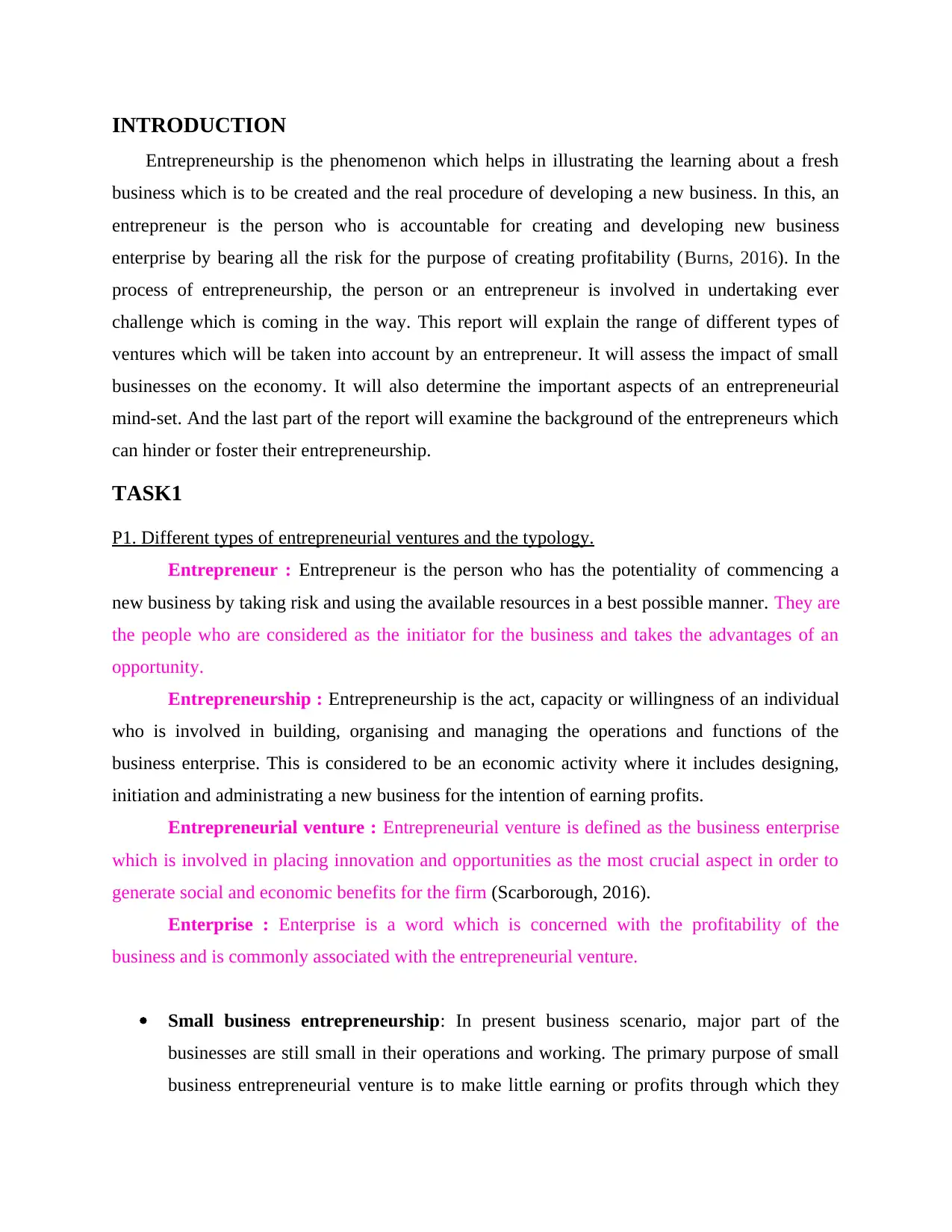
INTRODUCTION
Entrepreneurship is the phenomenon which helps in illustrating the learning about a fresh
business which is to be created and the real procedure of developing a new business. In this, an
entrepreneur is the person who is accountable for creating and developing new business
enterprise by bearing all the risk for the purpose of creating profitability (Burns, 2016). In the
process of entrepreneurship, the person or an entrepreneur is involved in undertaking ever
challenge which is coming in the way. This report will explain the range of different types of
ventures which will be taken into account by an entrepreneur. It will assess the impact of small
businesses on the economy. It will also determine the important aspects of an entrepreneurial
mind-set. And the last part of the report will examine the background of the entrepreneurs which
can hinder or foster their entrepreneurship.
TASK1
P1. Different types of entrepreneurial ventures and the typology.
Entrepreneur : Entrepreneur is the person who has the potentiality of commencing a
new business by taking risk and using the available resources in a best possible manner. They are
the people who are considered as the initiator for the business and takes the advantages of an
opportunity.
Entrepreneurship : Entrepreneurship is the act, capacity or willingness of an individual
who is involved in building, organising and managing the operations and functions of the
business enterprise. This is considered to be an economic activity where it includes designing,
initiation and administrating a new business for the intention of earning profits.
Entrepreneurial venture : Entrepreneurial venture is defined as the business enterprise
which is involved in placing innovation and opportunities as the most crucial aspect in order to
generate social and economic benefits for the firm (Scarborough, 2016).
Enterprise : Enterprise is a word which is concerned with the profitability of the
business and is commonly associated with the entrepreneurial venture.
Small business entrepreneurship: In present business scenario, major part of the
businesses are still small in their operations and working. The primary purpose of small
business entrepreneurial venture is to make little earning or profits through which they
Entrepreneurship is the phenomenon which helps in illustrating the learning about a fresh
business which is to be created and the real procedure of developing a new business. In this, an
entrepreneur is the person who is accountable for creating and developing new business
enterprise by bearing all the risk for the purpose of creating profitability (Burns, 2016). In the
process of entrepreneurship, the person or an entrepreneur is involved in undertaking ever
challenge which is coming in the way. This report will explain the range of different types of
ventures which will be taken into account by an entrepreneur. It will assess the impact of small
businesses on the economy. It will also determine the important aspects of an entrepreneurial
mind-set. And the last part of the report will examine the background of the entrepreneurs which
can hinder or foster their entrepreneurship.
TASK1
P1. Different types of entrepreneurial ventures and the typology.
Entrepreneur : Entrepreneur is the person who has the potentiality of commencing a
new business by taking risk and using the available resources in a best possible manner. They are
the people who are considered as the initiator for the business and takes the advantages of an
opportunity.
Entrepreneurship : Entrepreneurship is the act, capacity or willingness of an individual
who is involved in building, organising and managing the operations and functions of the
business enterprise. This is considered to be an economic activity where it includes designing,
initiation and administrating a new business for the intention of earning profits.
Entrepreneurial venture : Entrepreneurial venture is defined as the business enterprise
which is involved in placing innovation and opportunities as the most crucial aspect in order to
generate social and economic benefits for the firm (Scarborough, 2016).
Enterprise : Enterprise is a word which is concerned with the profitability of the
business and is commonly associated with the entrepreneurial venture.
Small business entrepreneurship: In present business scenario, major part of the
businesses are still small in their operations and working. The primary purpose of small
business entrepreneurial venture is to make little earning or profits through which they
⊘ This is a preview!⊘
Do you want full access?
Subscribe today to unlock all pages.

Trusted by 1+ million students worldwide
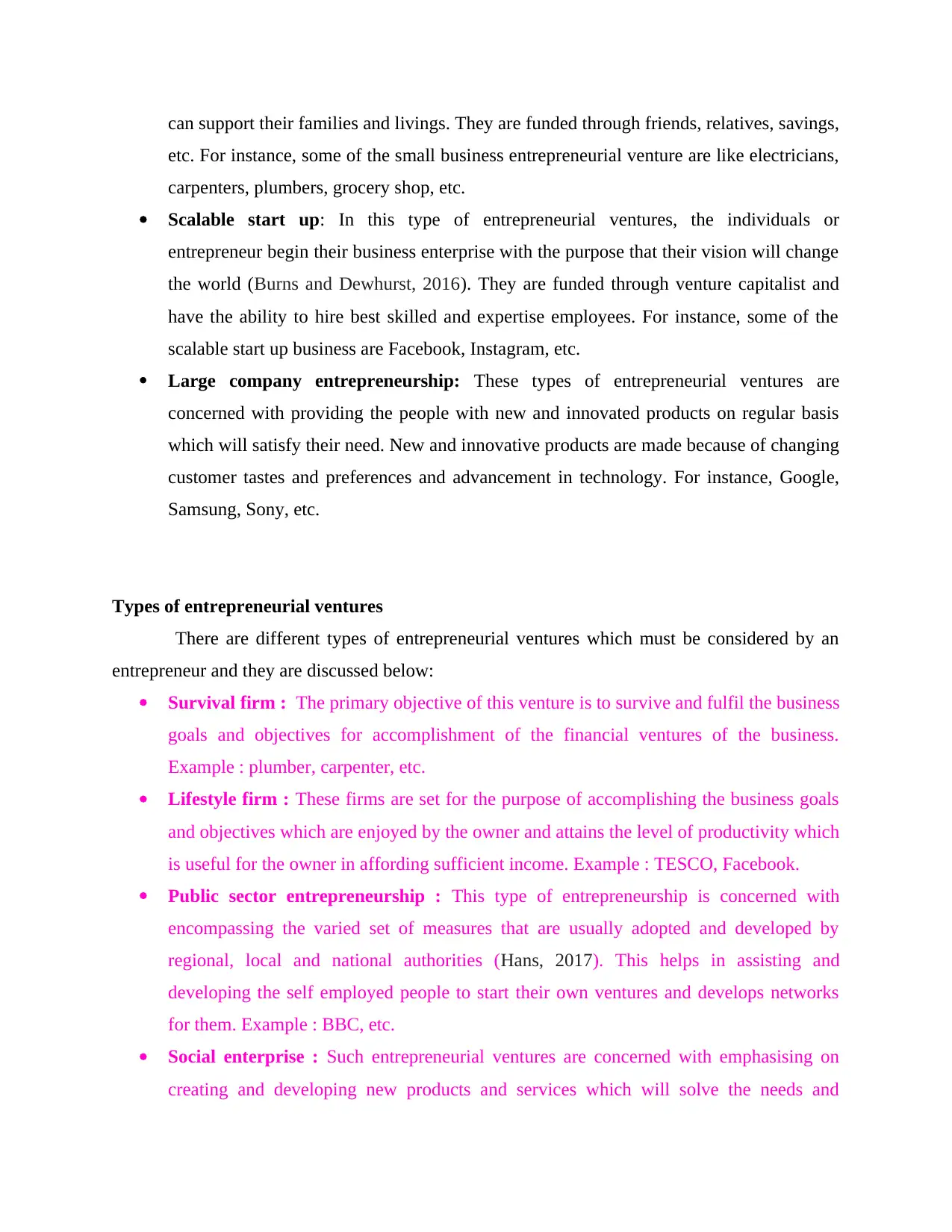
can support their families and livings. They are funded through friends, relatives, savings,
etc. For instance, some of the small business entrepreneurial venture are like electricians,
carpenters, plumbers, grocery shop, etc.
Scalable start up: In this type of entrepreneurial ventures, the individuals or
entrepreneur begin their business enterprise with the purpose that their vision will change
the world (Burns and Dewhurst, 2016). They are funded through venture capitalist and
have the ability to hire best skilled and expertise employees. For instance, some of the
scalable start up business are Facebook, Instagram, etc.
Large company entrepreneurship: These types of entrepreneurial ventures are
concerned with providing the people with new and innovated products on regular basis
which will satisfy their need. New and innovative products are made because of changing
customer tastes and preferences and advancement in technology. For instance, Google,
Samsung, Sony, etc.
Types of entrepreneurial ventures
There are different types of entrepreneurial ventures which must be considered by an
entrepreneur and they are discussed below:
Survival firm : The primary objective of this venture is to survive and fulfil the business
goals and objectives for accomplishment of the financial ventures of the business.
Example : plumber, carpenter, etc.
Lifestyle firm : These firms are set for the purpose of accomplishing the business goals
and objectives which are enjoyed by the owner and attains the level of productivity which
is useful for the owner in affording sufficient income. Example : TESCO, Facebook.
Public sector entrepreneurship : This type of entrepreneurship is concerned with
encompassing the varied set of measures that are usually adopted and developed by
regional, local and national authorities (Hans, 2017). This helps in assisting and
developing the self employed people to start their own ventures and develops networks
for them. Example : BBC, etc.
Social enterprise : Such entrepreneurial ventures are concerned with emphasising on
creating and developing new products and services which will solve the needs and
etc. For instance, some of the small business entrepreneurial venture are like electricians,
carpenters, plumbers, grocery shop, etc.
Scalable start up: In this type of entrepreneurial ventures, the individuals or
entrepreneur begin their business enterprise with the purpose that their vision will change
the world (Burns and Dewhurst, 2016). They are funded through venture capitalist and
have the ability to hire best skilled and expertise employees. For instance, some of the
scalable start up business are Facebook, Instagram, etc.
Large company entrepreneurship: These types of entrepreneurial ventures are
concerned with providing the people with new and innovated products on regular basis
which will satisfy their need. New and innovative products are made because of changing
customer tastes and preferences and advancement in technology. For instance, Google,
Samsung, Sony, etc.
Types of entrepreneurial ventures
There are different types of entrepreneurial ventures which must be considered by an
entrepreneur and they are discussed below:
Survival firm : The primary objective of this venture is to survive and fulfil the business
goals and objectives for accomplishment of the financial ventures of the business.
Example : plumber, carpenter, etc.
Lifestyle firm : These firms are set for the purpose of accomplishing the business goals
and objectives which are enjoyed by the owner and attains the level of productivity which
is useful for the owner in affording sufficient income. Example : TESCO, Facebook.
Public sector entrepreneurship : This type of entrepreneurship is concerned with
encompassing the varied set of measures that are usually adopted and developed by
regional, local and national authorities (Hans, 2017). This helps in assisting and
developing the self employed people to start their own ventures and develops networks
for them. Example : BBC, etc.
Social enterprise : Such entrepreneurial ventures are concerned with emphasising on
creating and developing new products and services which will solve the needs and
Paraphrase This Document
Need a fresh take? Get an instant paraphrase of this document with our AI Paraphraser
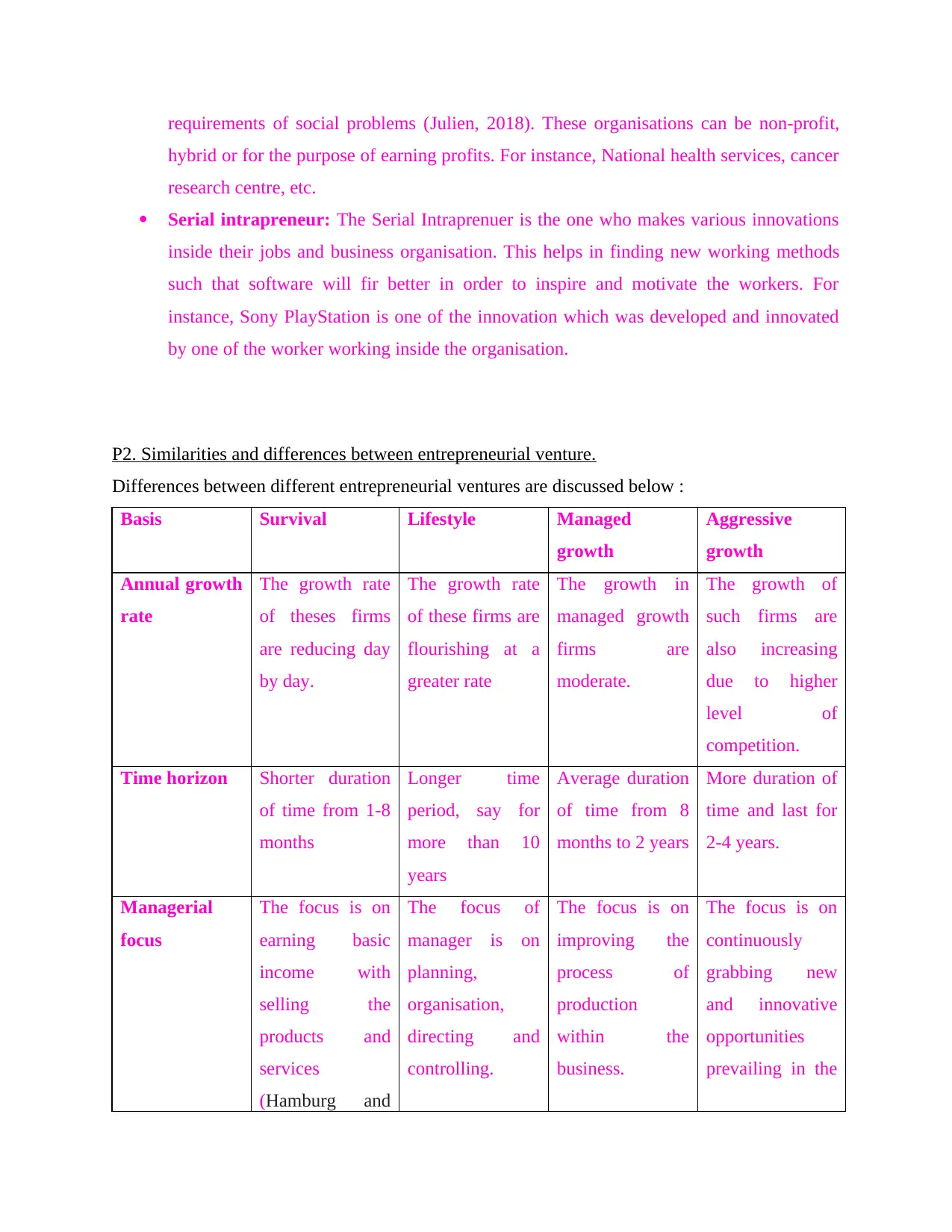
requirements of social problems (Julien, 2018). These organisations can be non-profit,
hybrid or for the purpose of earning profits. For instance, National health services, cancer
research centre, etc.
Serial intrapreneur: The Serial Intraprenuer is the one who makes various innovations
inside their jobs and business organisation. This helps in finding new working methods
such that software will fir better in order to inspire and motivate the workers. For
instance, Sony PlayStation is one of the innovation which was developed and innovated
by one of the worker working inside the organisation.
P2. Similarities and differences between entrepreneurial venture.
Differences between different entrepreneurial ventures are discussed below :
Basis Survival Lifestyle Managed
growth
Aggressive
growth
Annual growth
rate
The growth rate
of theses firms
are reducing day
by day.
The growth rate
of these firms are
flourishing at a
greater rate
The growth in
managed growth
firms are
moderate.
The growth of
such firms are
also increasing
due to higher
level of
competition.
Time horizon Shorter duration
of time from 1-8
months
Longer time
period, say for
more than 10
years
Average duration
of time from 8
months to 2 years
More duration of
time and last for
2-4 years.
Managerial
focus
The focus is on
earning basic
income with
selling the
products and
services
(Hamburg and
The focus of
manager is on
planning,
organisation,
directing and
controlling.
The focus is on
improving the
process of
production
within the
business.
The focus is on
continuously
grabbing new
and innovative
opportunities
prevailing in the
hybrid or for the purpose of earning profits. For instance, National health services, cancer
research centre, etc.
Serial intrapreneur: The Serial Intraprenuer is the one who makes various innovations
inside their jobs and business organisation. This helps in finding new working methods
such that software will fir better in order to inspire and motivate the workers. For
instance, Sony PlayStation is one of the innovation which was developed and innovated
by one of the worker working inside the organisation.
P2. Similarities and differences between entrepreneurial venture.
Differences between different entrepreneurial ventures are discussed below :
Basis Survival Lifestyle Managed
growth
Aggressive
growth
Annual growth
rate
The growth rate
of theses firms
are reducing day
by day.
The growth rate
of these firms are
flourishing at a
greater rate
The growth in
managed growth
firms are
moderate.
The growth of
such firms are
also increasing
due to higher
level of
competition.
Time horizon Shorter duration
of time from 1-8
months
Longer time
period, say for
more than 10
years
Average duration
of time from 8
months to 2 years
More duration of
time and last for
2-4 years.
Managerial
focus
The focus is on
earning basic
income with
selling the
products and
services
(Hamburg and
The focus of
manager is on
planning,
organisation,
directing and
controlling.
The focus is on
improving the
process of
production
within the
business.
The focus is on
continuously
grabbing new
and innovative
opportunities
prevailing in the
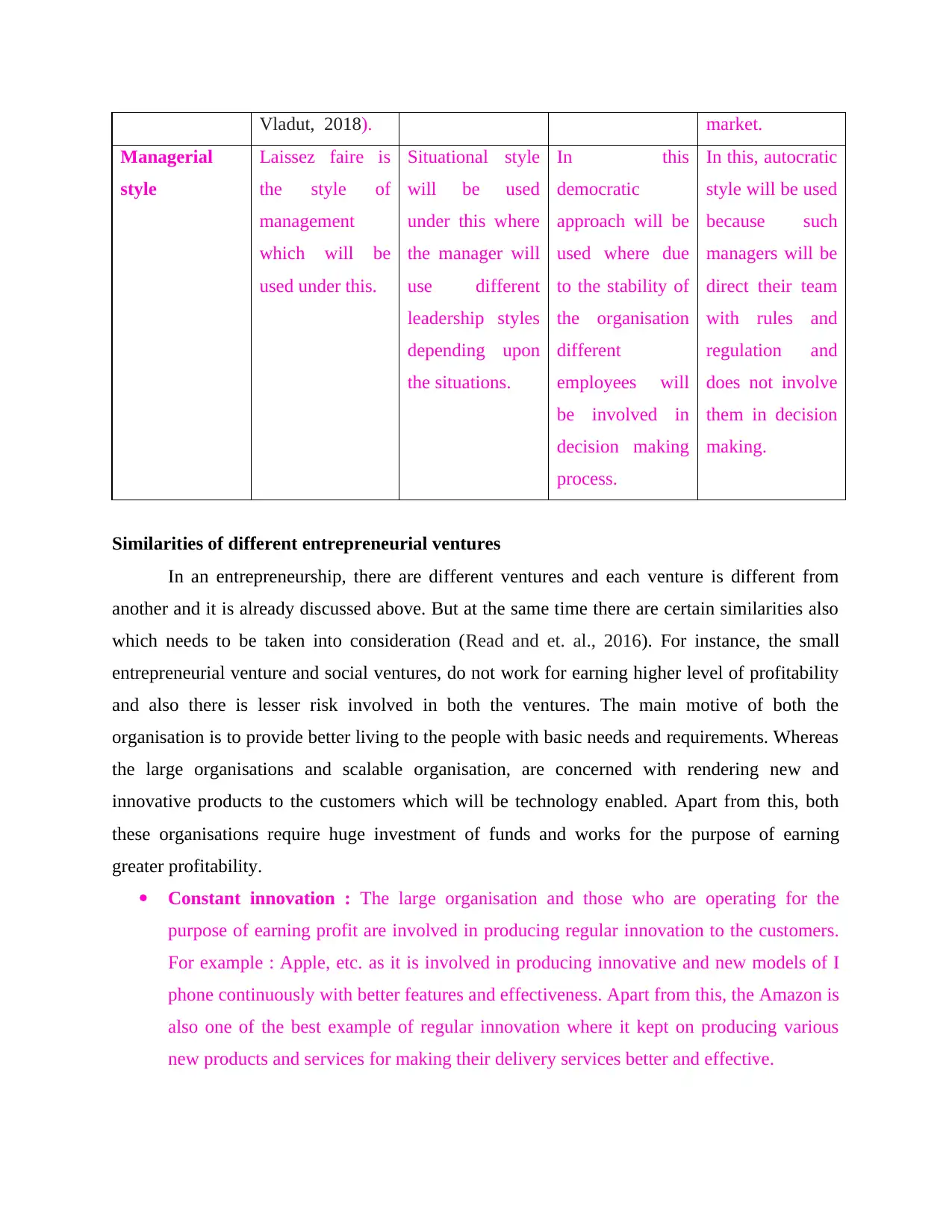
Vladut, 2018). market.
Managerial
style
Laissez faire is
the style of
management
which will be
used under this.
Situational style
will be used
under this where
the manager will
use different
leadership styles
depending upon
the situations.
In this
democratic
approach will be
used where due
to the stability of
the organisation
different
employees will
be involved in
decision making
process.
In this, autocratic
style will be used
because such
managers will be
direct their team
with rules and
regulation and
does not involve
them in decision
making.
Similarities of different entrepreneurial ventures
In an entrepreneurship, there are different ventures and each venture is different from
another and it is already discussed above. But at the same time there are certain similarities also
which needs to be taken into consideration (Read and et. al., 2016). For instance, the small
entrepreneurial venture and social ventures, do not work for earning higher level of profitability
and also there is lesser risk involved in both the ventures. The main motive of both the
organisation is to provide better living to the people with basic needs and requirements. Whereas
the large organisations and scalable organisation, are concerned with rendering new and
innovative products to the customers which will be technology enabled. Apart from this, both
these organisations require huge investment of funds and works for the purpose of earning
greater profitability.
Constant innovation : The large organisation and those who are operating for the
purpose of earning profit are involved in producing regular innovation to the customers.
For example : Apple, etc. as it is involved in producing innovative and new models of I
phone continuously with better features and effectiveness. Apart from this, the Amazon is
also one of the best example of regular innovation where it kept on producing various
new products and services for making their delivery services better and effective.
Managerial
style
Laissez faire is
the style of
management
which will be
used under this.
Situational style
will be used
under this where
the manager will
use different
leadership styles
depending upon
the situations.
In this
democratic
approach will be
used where due
to the stability of
the organisation
different
employees will
be involved in
decision making
process.
In this, autocratic
style will be used
because such
managers will be
direct their team
with rules and
regulation and
does not involve
them in decision
making.
Similarities of different entrepreneurial ventures
In an entrepreneurship, there are different ventures and each venture is different from
another and it is already discussed above. But at the same time there are certain similarities also
which needs to be taken into consideration (Read and et. al., 2016). For instance, the small
entrepreneurial venture and social ventures, do not work for earning higher level of profitability
and also there is lesser risk involved in both the ventures. The main motive of both the
organisation is to provide better living to the people with basic needs and requirements. Whereas
the large organisations and scalable organisation, are concerned with rendering new and
innovative products to the customers which will be technology enabled. Apart from this, both
these organisations require huge investment of funds and works for the purpose of earning
greater profitability.
Constant innovation : The large organisation and those who are operating for the
purpose of earning profit are involved in producing regular innovation to the customers.
For example : Apple, etc. as it is involved in producing innovative and new models of I
phone continuously with better features and effectiveness. Apart from this, the Amazon is
also one of the best example of regular innovation where it kept on producing various
new products and services for making their delivery services better and effective.
⊘ This is a preview!⊘
Do you want full access?
Subscribe today to unlock all pages.

Trusted by 1+ million students worldwide

Strong willed entrepreneur : The public sector entrepreneur and social entrepreneur has
a similarity that both of these entrepreneur are having strong will power and they stay
motivated and encouraged towards their work. They both work for the common aim of
fulfilling the needs and requirements of the people and contributes in the development of
society (Othman and. et. al., 2017). For instance, the NHS is the public organisation
where the entrepreneur is strongly influenced to work for the betterment of the people by
providing them with health services. Whereas cancer research health centre is the social
organisation which also aims to treat the cancer patients and makes them free from
diseases by providing benefits in their health and medication.
Funding from some venture capitalist and investors : The managed growth firms and
corporate firms are funded through some investors because they require huge amount of
money. For instance, J P Morgan is the managed growth firm in UK which deals in asset
management and requires heavy investment (Ugorji and Ani, 2018). Whereas, London
stock exchange is a corporate firm which deals in trading and it also requires funding in
form of selling shares and buying shares from different investors.
Creative idea : The large organisations and profit motive companies who have the aim
of satisfying customers and earning profits works with creative ideas which makes them
attain success day by day. These business enterprise, with their creative ideas can attain
the business objectives and goals and also establish themselves in the market with
creative manner. For instance, the large organisation like Mark and Spencer has
successfully established itself in the market with it is every day innovation in the retail
sector and profit motive companies like Amazon has also differentiated itself successfully
in terms of establishing its store which have no employees and this creative idea has
attained the business profits and goals for the company.
Sustain against large businesses : The survival business firms and small businesses
have similarity in them which enhances them to sustain their businesses by
accomplishing the financial obligations. In such businesses the main aim of the
companies is to earn sufficient income so that they can afford the food, home and water
for themselves (Eze and Gladys, 2016). For instance, the survival firm are the small
bakeries or mobile shops, etc. where people sell their products in order to earn basic
a similarity that both of these entrepreneur are having strong will power and they stay
motivated and encouraged towards their work. They both work for the common aim of
fulfilling the needs and requirements of the people and contributes in the development of
society (Othman and. et. al., 2017). For instance, the NHS is the public organisation
where the entrepreneur is strongly influenced to work for the betterment of the people by
providing them with health services. Whereas cancer research health centre is the social
organisation which also aims to treat the cancer patients and makes them free from
diseases by providing benefits in their health and medication.
Funding from some venture capitalist and investors : The managed growth firms and
corporate firms are funded through some investors because they require huge amount of
money. For instance, J P Morgan is the managed growth firm in UK which deals in asset
management and requires heavy investment (Ugorji and Ani, 2018). Whereas, London
stock exchange is a corporate firm which deals in trading and it also requires funding in
form of selling shares and buying shares from different investors.
Creative idea : The large organisations and profit motive companies who have the aim
of satisfying customers and earning profits works with creative ideas which makes them
attain success day by day. These business enterprise, with their creative ideas can attain
the business objectives and goals and also establish themselves in the market with
creative manner. For instance, the large organisation like Mark and Spencer has
successfully established itself in the market with it is every day innovation in the retail
sector and profit motive companies like Amazon has also differentiated itself successfully
in terms of establishing its store which have no employees and this creative idea has
attained the business profits and goals for the company.
Sustain against large businesses : The survival business firms and small businesses
have similarity in them which enhances them to sustain their businesses by
accomplishing the financial obligations. In such businesses the main aim of the
companies is to earn sufficient income so that they can afford the food, home and water
for themselves (Eze and Gladys, 2016). For instance, the survival firm are the small
bakeries or mobile shops, etc. where people sell their products in order to earn basic
Paraphrase This Document
Need a fresh take? Get an instant paraphrase of this document with our AI Paraphraser
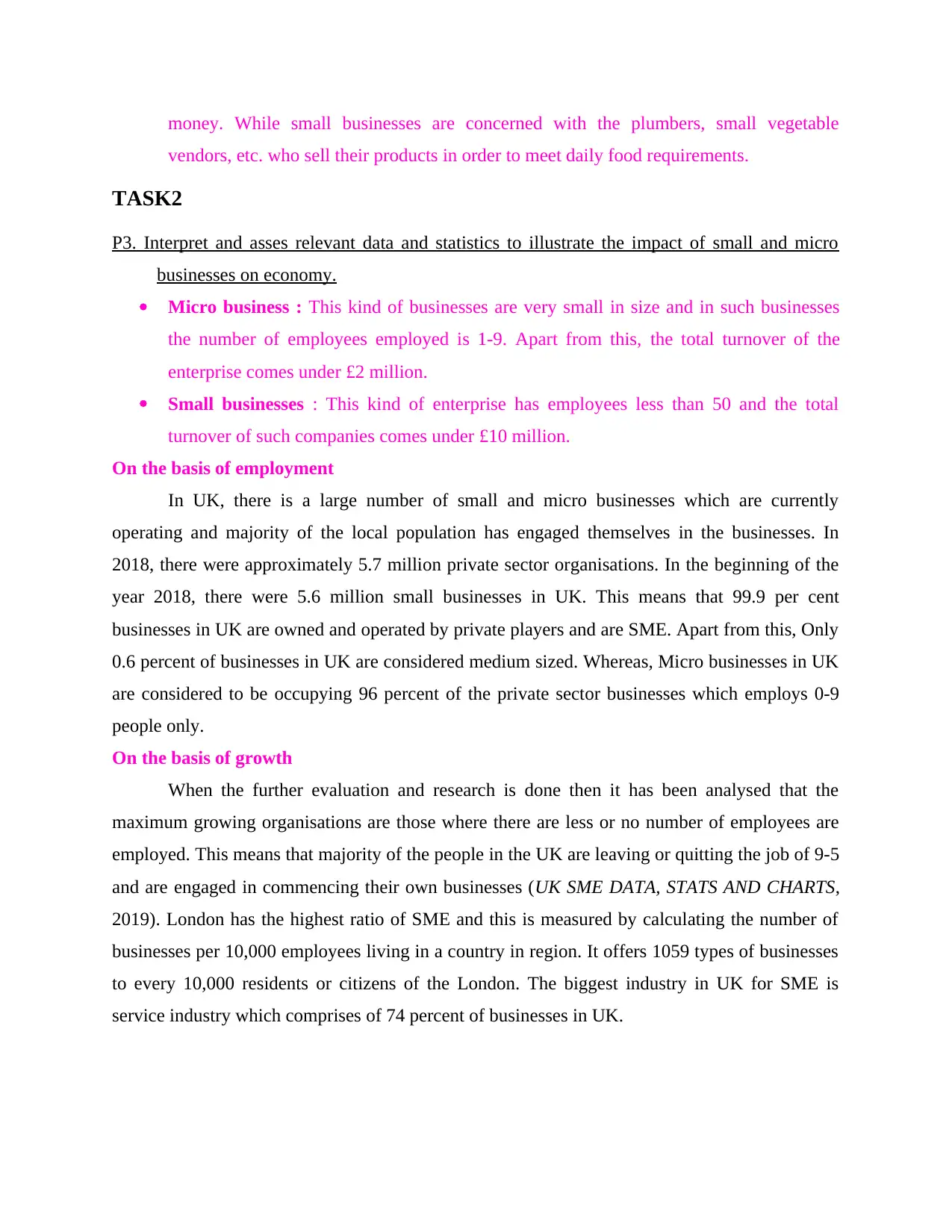
money. While small businesses are concerned with the plumbers, small vegetable
vendors, etc. who sell their products in order to meet daily food requirements.
TASK2
P3. Interpret and asses relevant data and statistics to illustrate the impact of small and micro
businesses on economy.
Micro business : This kind of businesses are very small in size and in such businesses
the number of employees employed is 1-9. Apart from this, the total turnover of the
enterprise comes under £2 million.
Small businesses : This kind of enterprise has employees less than 50 and the total
turnover of such companies comes under £10 million.
On the basis of employment
In UK, there is a large number of small and micro businesses which are currently
operating and majority of the local population has engaged themselves in the businesses. In
2018, there were approximately 5.7 million private sector organisations. In the beginning of the
year 2018, there were 5.6 million small businesses in UK. This means that 99.9 per cent
businesses in UK are owned and operated by private players and are SME. Apart from this, Only
0.6 percent of businesses in UK are considered medium sized. Whereas, Micro businesses in UK
are considered to be occupying 96 percent of the private sector businesses which employs 0-9
people only.
On the basis of growth
When the further evaluation and research is done then it has been analysed that the
maximum growing organisations are those where there are less or no number of employees are
employed. This means that majority of the people in the UK are leaving or quitting the job of 9-5
and are engaged in commencing their own businesses (UK SME DATA, STATS AND CHARTS,
2019). London has the highest ratio of SME and this is measured by calculating the number of
businesses per 10,000 employees living in a country in region. It offers 1059 types of businesses
to every 10,000 residents or citizens of the London. The biggest industry in UK for SME is
service industry which comprises of 74 percent of businesses in UK.
vendors, etc. who sell their products in order to meet daily food requirements.
TASK2
P3. Interpret and asses relevant data and statistics to illustrate the impact of small and micro
businesses on economy.
Micro business : This kind of businesses are very small in size and in such businesses
the number of employees employed is 1-9. Apart from this, the total turnover of the
enterprise comes under £2 million.
Small businesses : This kind of enterprise has employees less than 50 and the total
turnover of such companies comes under £10 million.
On the basis of employment
In UK, there is a large number of small and micro businesses which are currently
operating and majority of the local population has engaged themselves in the businesses. In
2018, there were approximately 5.7 million private sector organisations. In the beginning of the
year 2018, there were 5.6 million small businesses in UK. This means that 99.9 per cent
businesses in UK are owned and operated by private players and are SME. Apart from this, Only
0.6 percent of businesses in UK are considered medium sized. Whereas, Micro businesses in UK
are considered to be occupying 96 percent of the private sector businesses which employs 0-9
people only.
On the basis of growth
When the further evaluation and research is done then it has been analysed that the
maximum growing organisations are those where there are less or no number of employees are
employed. This means that majority of the people in the UK are leaving or quitting the job of 9-5
and are engaged in commencing their own businesses (UK SME DATA, STATS AND CHARTS,
2019). London has the highest ratio of SME and this is measured by calculating the number of
businesses per 10,000 employees living in a country in region. It offers 1059 types of businesses
to every 10,000 residents or citizens of the London. The biggest industry in UK for SME is
service industry which comprises of 74 percent of businesses in UK.
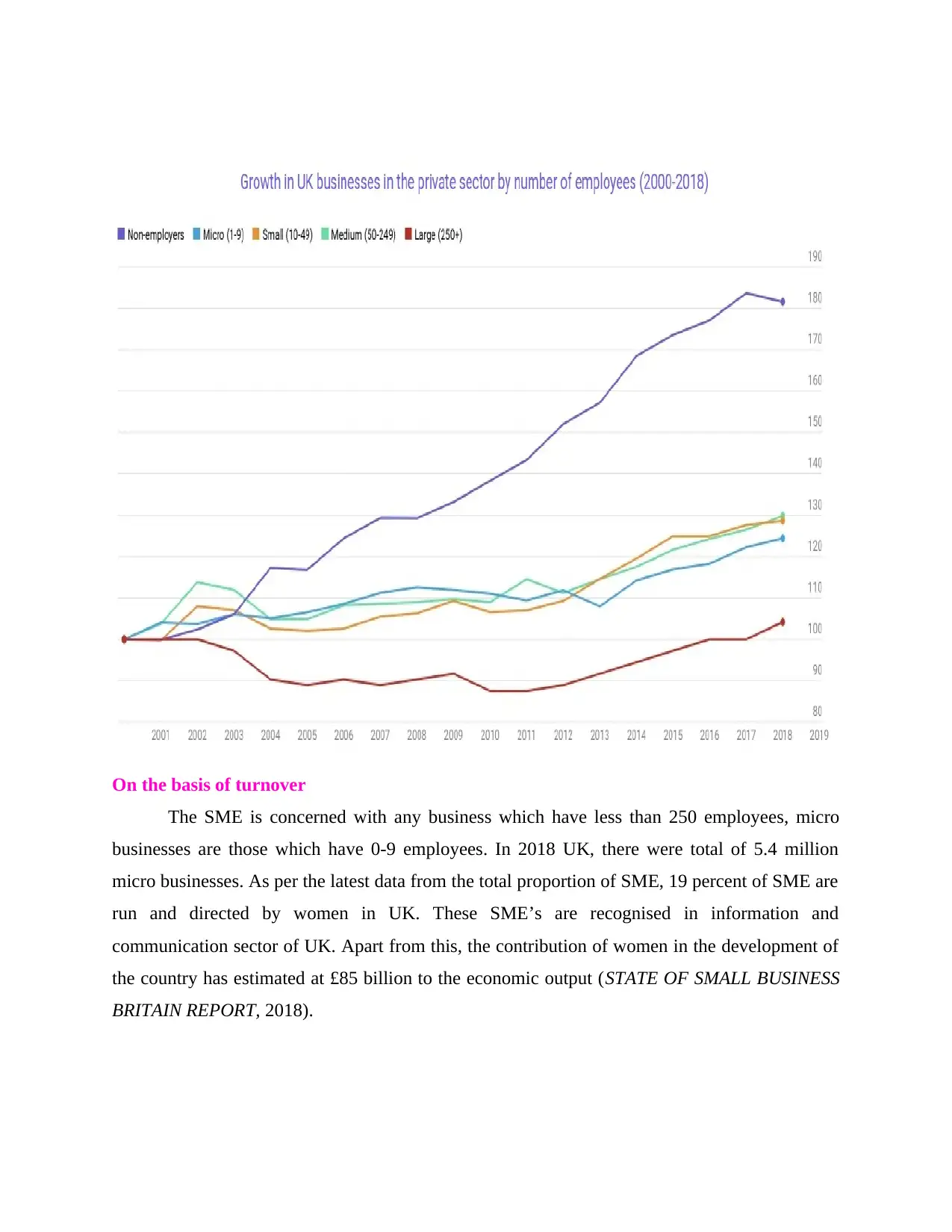
On the basis of turnover
The SME is concerned with any business which have less than 250 employees, micro
businesses are those which have 0-9 employees. In 2018 UK, there were total of 5.4 million
micro businesses. As per the latest data from the total proportion of SME, 19 percent of SME are
run and directed by women in UK. These SME’s are recognised in information and
communication sector of UK. Apart from this, the contribution of women in the development of
the country has estimated at £85 billion to the economic output (STATE OF SMALL BUSINESS
BRITAIN REPORT, 2018).
The SME is concerned with any business which have less than 250 employees, micro
businesses are those which have 0-9 employees. In 2018 UK, there were total of 5.4 million
micro businesses. As per the latest data from the total proportion of SME, 19 percent of SME are
run and directed by women in UK. These SME’s are recognised in information and
communication sector of UK. Apart from this, the contribution of women in the development of
the country has estimated at £85 billion to the economic output (STATE OF SMALL BUSINESS
BRITAIN REPORT, 2018).
⊘ This is a preview!⊘
Do you want full access?
Subscribe today to unlock all pages.

Trusted by 1+ million students worldwide
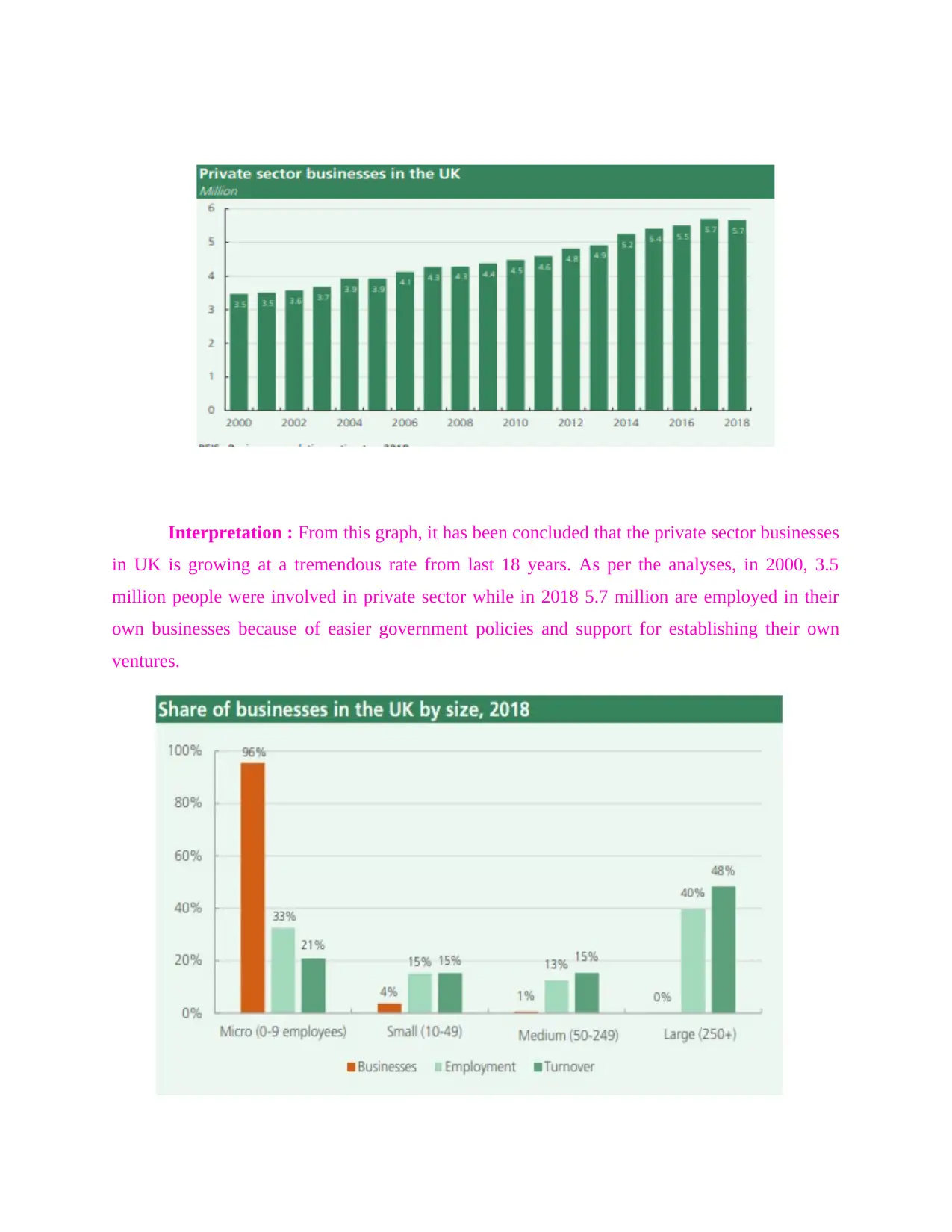
Interpretation : From this graph, it has been concluded that the private sector businesses
in UK is growing at a tremendous rate from last 18 years. As per the analyses, in 2000, 3.5
million people were involved in private sector while in 2018 5.7 million are employed in their
own businesses because of easier government policies and support for establishing their own
ventures.
in UK is growing at a tremendous rate from last 18 years. As per the analyses, in 2000, 3.5
million people were involved in private sector while in 2018 5.7 million are employed in their
own businesses because of easier government policies and support for establishing their own
ventures.
Paraphrase This Document
Need a fresh take? Get an instant paraphrase of this document with our AI Paraphraser
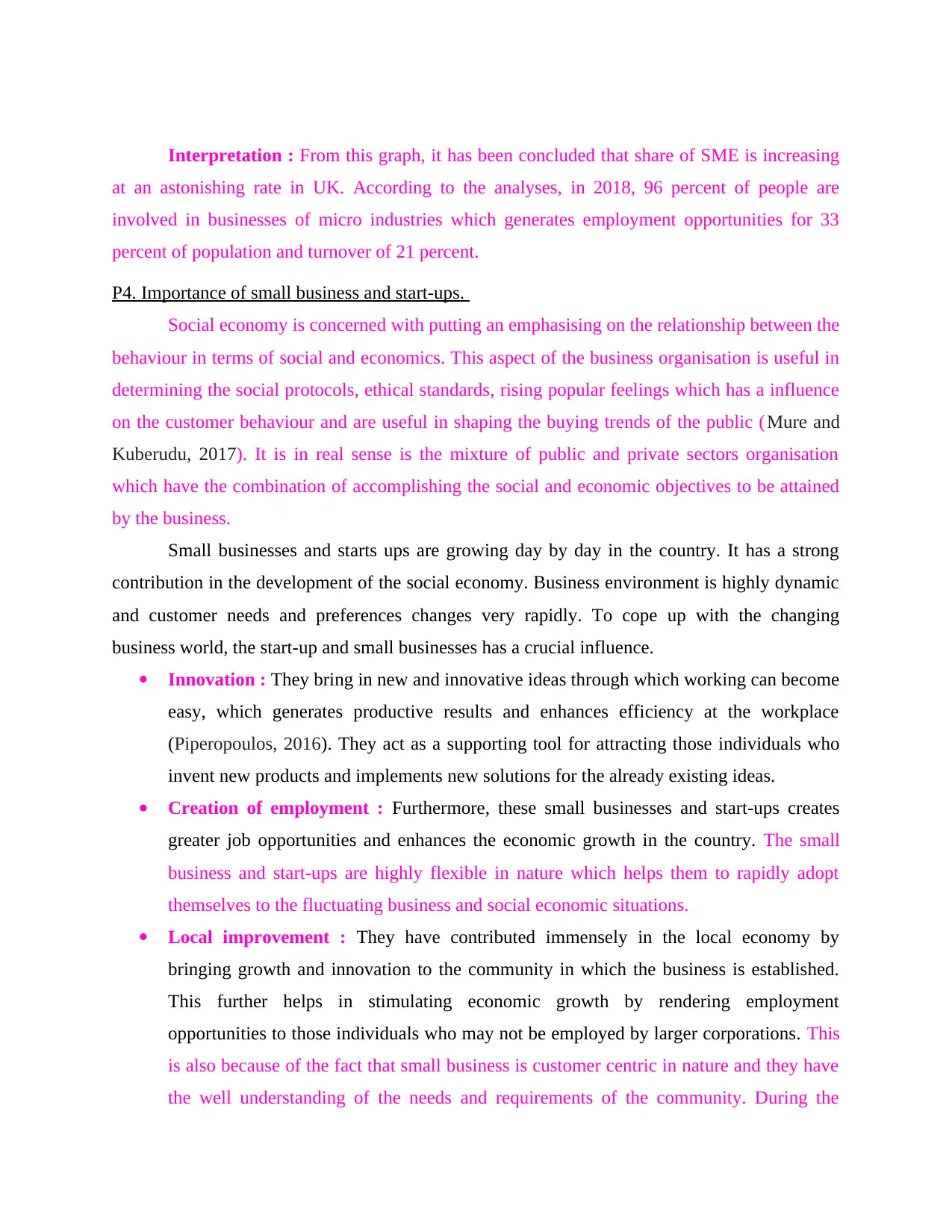
Interpretation : From this graph, it has been concluded that share of SME is increasing
at an astonishing rate in UK. According to the analyses, in 2018, 96 percent of people are
involved in businesses of micro industries which generates employment opportunities for 33
percent of population and turnover of 21 percent.
P4. Importance of small business and start-ups.
Social economy is concerned with putting an emphasising on the relationship between the
behaviour in terms of social and economics. This aspect of the business organisation is useful in
determining the social protocols, ethical standards, rising popular feelings which has a influence
on the customer behaviour and are useful in shaping the buying trends of the public (Mure and
Kuberudu, 2017). It is in real sense is the mixture of public and private sectors organisation
which have the combination of accomplishing the social and economic objectives to be attained
by the business.
Small businesses and starts ups are growing day by day in the country. It has a strong
contribution in the development of the social economy. Business environment is highly dynamic
and customer needs and preferences changes very rapidly. To cope up with the changing
business world, the start-up and small businesses has a crucial influence.
Innovation : They bring in new and innovative ideas through which working can become
easy, which generates productive results and enhances efficiency at the workplace
(Piperopoulos, 2016). They act as a supporting tool for attracting those individuals who
invent new products and implements new solutions for the already existing ideas.
Creation of employment : Furthermore, these small businesses and start-ups creates
greater job opportunities and enhances the economic growth in the country. The small
business and start-ups are highly flexible in nature which helps them to rapidly adopt
themselves to the fluctuating business and social economic situations.
Local improvement : They have contributed immensely in the local economy by
bringing growth and innovation to the community in which the business is established.
This further helps in stimulating economic growth by rendering employment
opportunities to those individuals who may not be employed by larger corporations. This
is also because of the fact that small business is customer centric in nature and they have
the well understanding of the needs and requirements of the community. During the
at an astonishing rate in UK. According to the analyses, in 2018, 96 percent of people are
involved in businesses of micro industries which generates employment opportunities for 33
percent of population and turnover of 21 percent.
P4. Importance of small business and start-ups.
Social economy is concerned with putting an emphasising on the relationship between the
behaviour in terms of social and economics. This aspect of the business organisation is useful in
determining the social protocols, ethical standards, rising popular feelings which has a influence
on the customer behaviour and are useful in shaping the buying trends of the public (Mure and
Kuberudu, 2017). It is in real sense is the mixture of public and private sectors organisation
which have the combination of accomplishing the social and economic objectives to be attained
by the business.
Small businesses and starts ups are growing day by day in the country. It has a strong
contribution in the development of the social economy. Business environment is highly dynamic
and customer needs and preferences changes very rapidly. To cope up with the changing
business world, the start-up and small businesses has a crucial influence.
Innovation : They bring in new and innovative ideas through which working can become
easy, which generates productive results and enhances efficiency at the workplace
(Piperopoulos, 2016). They act as a supporting tool for attracting those individuals who
invent new products and implements new solutions for the already existing ideas.
Creation of employment : Furthermore, these small businesses and start-ups creates
greater job opportunities and enhances the economic growth in the country. The small
business and start-ups are highly flexible in nature which helps them to rapidly adopt
themselves to the fluctuating business and social economic situations.
Local improvement : They have contributed immensely in the local economy by
bringing growth and innovation to the community in which the business is established.
This further helps in stimulating economic growth by rendering employment
opportunities to those individuals who may not be employed by larger corporations. This
is also because of the fact that small business is customer centric in nature and they have
the well understanding of the needs and requirements of the community. During the
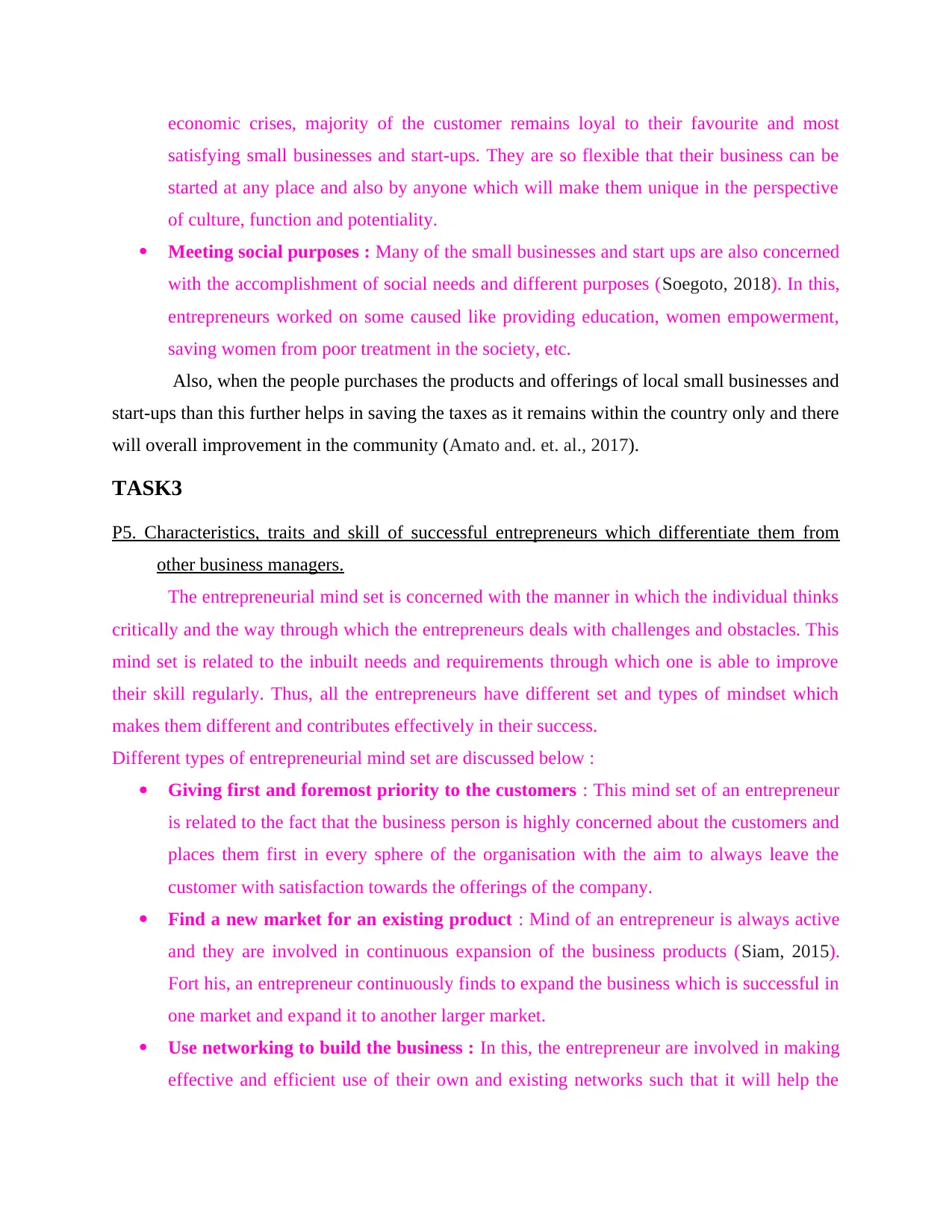
economic crises, majority of the customer remains loyal to their favourite and most
satisfying small businesses and start-ups. They are so flexible that their business can be
started at any place and also by anyone which will make them unique in the perspective
of culture, function and potentiality.
Meeting social purposes : Many of the small businesses and start ups are also concerned
with the accomplishment of social needs and different purposes (Soegoto, 2018). In this,
entrepreneurs worked on some caused like providing education, women empowerment,
saving women from poor treatment in the society, etc.
Also, when the people purchases the products and offerings of local small businesses and
start-ups than this further helps in saving the taxes as it remains within the country only and there
will overall improvement in the community (Amato and. et. al., 2017).
TASK3
P5. Characteristics, traits and skill of successful entrepreneurs which differentiate them from
other business managers.
The entrepreneurial mind set is concerned with the manner in which the individual thinks
critically and the way through which the entrepreneurs deals with challenges and obstacles. This
mind set is related to the inbuilt needs and requirements through which one is able to improve
their skill regularly. Thus, all the entrepreneurs have different set and types of mindset which
makes them different and contributes effectively in their success.
Different types of entrepreneurial mind set are discussed below :
Giving first and foremost priority to the customers : This mind set of an entrepreneur
is related to the fact that the business person is highly concerned about the customers and
places them first in every sphere of the organisation with the aim to always leave the
customer with satisfaction towards the offerings of the company.
Find a new market for an existing product : Mind of an entrepreneur is always active
and they are involved in continuous expansion of the business products (Siam, 2015).
Fort his, an entrepreneur continuously finds to expand the business which is successful in
one market and expand it to another larger market.
Use networking to build the business : In this, the entrepreneur are involved in making
effective and efficient use of their own and existing networks such that it will help the
satisfying small businesses and start-ups. They are so flexible that their business can be
started at any place and also by anyone which will make them unique in the perspective
of culture, function and potentiality.
Meeting social purposes : Many of the small businesses and start ups are also concerned
with the accomplishment of social needs and different purposes (Soegoto, 2018). In this,
entrepreneurs worked on some caused like providing education, women empowerment,
saving women from poor treatment in the society, etc.
Also, when the people purchases the products and offerings of local small businesses and
start-ups than this further helps in saving the taxes as it remains within the country only and there
will overall improvement in the community (Amato and. et. al., 2017).
TASK3
P5. Characteristics, traits and skill of successful entrepreneurs which differentiate them from
other business managers.
The entrepreneurial mind set is concerned with the manner in which the individual thinks
critically and the way through which the entrepreneurs deals with challenges and obstacles. This
mind set is related to the inbuilt needs and requirements through which one is able to improve
their skill regularly. Thus, all the entrepreneurs have different set and types of mindset which
makes them different and contributes effectively in their success.
Different types of entrepreneurial mind set are discussed below :
Giving first and foremost priority to the customers : This mind set of an entrepreneur
is related to the fact that the business person is highly concerned about the customers and
places them first in every sphere of the organisation with the aim to always leave the
customer with satisfaction towards the offerings of the company.
Find a new market for an existing product : Mind of an entrepreneur is always active
and they are involved in continuous expansion of the business products (Siam, 2015).
Fort his, an entrepreneur continuously finds to expand the business which is successful in
one market and expand it to another larger market.
Use networking to build the business : In this, the entrepreneur are involved in making
effective and efficient use of their own and existing networks such that it will help the
⊘ This is a preview!⊘
Do you want full access?
Subscribe today to unlock all pages.

Trusted by 1+ million students worldwide
1 out of 22
Related Documents
Your All-in-One AI-Powered Toolkit for Academic Success.
+13062052269
info@desklib.com
Available 24*7 on WhatsApp / Email
![[object Object]](/_next/static/media/star-bottom.7253800d.svg)
Unlock your academic potential
Copyright © 2020–2026 A2Z Services. All Rights Reserved. Developed and managed by ZUCOL.





